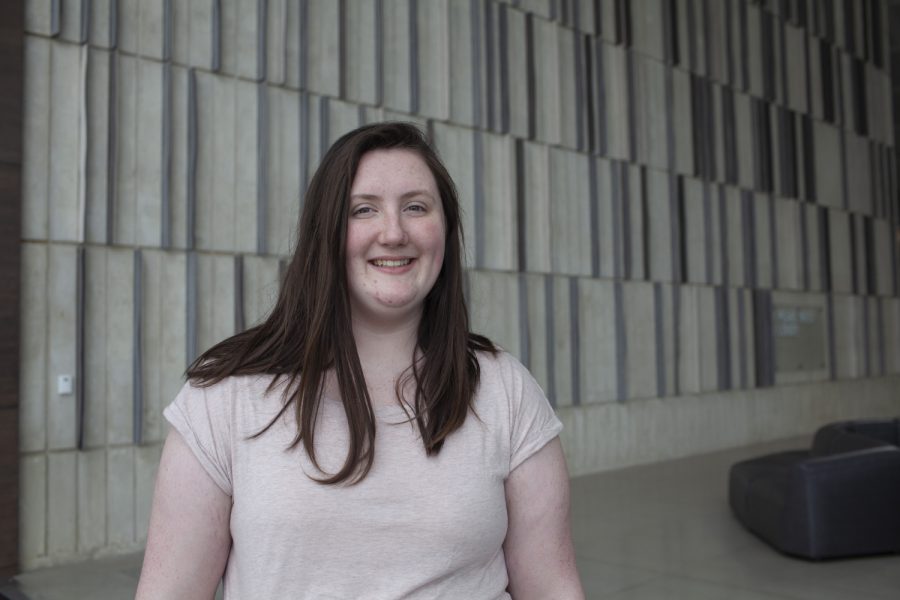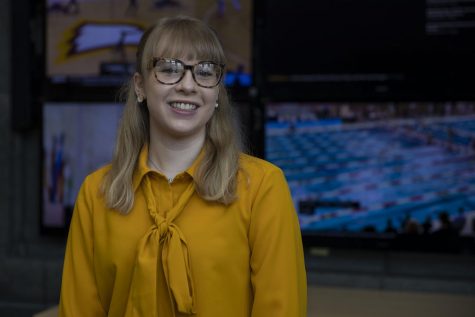Fulbright scholars return home after their trips abroad were cut short by COVID-19 spread
At least two 2019-20 Fulbright Scholars returned home after the program asked them to evacuate amid the spread of the novel coronavirus. Both returned to the U.S. unemployed and uncertain about what the future holds for them.
Jill Oberhart poses for a portrait at Voxman Music Building on June 28, 2019. Oberhart is a recipient of Fulbright scholarship.
April 13, 2020
Plans to travel to Brazil to teach English through the Fulbright Program were two years in the making for University of Iowa alum Jill Oberhart. She spent only one month in the country instead of the nine she expected after the U.S. State Department told her to evacuate.
Oberhart, who graduated from the UI in spring 2019 as a double major in music and psychology with minors in Spanish and Portuguese, returned home to financial uncertainty amid the outbreak of the novel coronavirus.
Before she had to leave, Oberhart began working in Brazil as an English Teaching Assistant in February as part of the Fulbright Program, a federal government-sponsored program offering competitive grants for students to conduct research or study for a year in another country. Oberhart had a week of orientation for her Fulbright Program before moving to her host city of Alfenas.
Classes at the university at which she planned to teach were delayed another week for Carnival, a festival marking the beginning of Lent, the 40-day period before Easter. By the time Oberhart received an email from the Fulbright Program asking participants to evacuate because of the spread of COVID-19, she had not started teaching.
“I wanted to throw up,” Oberhart said. “It was really, really upsetting. It took me two years to get to Brazil essentially, and all of that is done. We obviously can’t come back this year.”
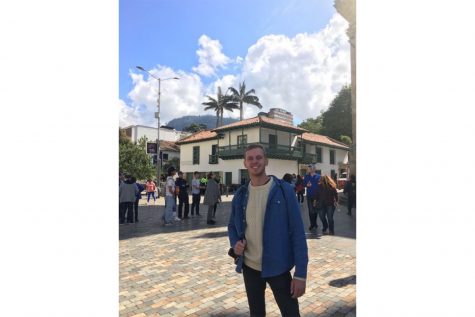
After the U.S. State Department issued a Global Health Advisory-Do Not Travel order March 19 instructing Americans abroad to either return home or shelter in place, the Fulbright Program was suspended, according to the program’s website.
The program suspension applies only to Americans abroad participating in the Fulbright Program. All Fulbright participants, regardless of how long they were in the program, will retain Fulbright Alumni status, according to the website.
The State Department urged Fulbright scholars to return home and offered assistance and to fully fund their travel home on Feb. 28, March 11, and March 19, an official from the department said in an email to The Daily Iowan. The Bureau of Educational and Cultural Affairs repeatedly urged Fulbright participants to return from overseas for several weeks, they said.
“The bureau offered to help arrange their travel, including paying any increased transportation costs, provided stipends through June 30 for all Fulbrighters to aid in their transition, and assured all participants that they would retain alumni status of their programs,” the official said.
The situation in the U.S. was in flux and Fulbright had started seeing other counties restrict travel, and the U.S. State Department put a level-three travel warning in place. After the State Department raised the advisory to a level four, scholars had to return home, UI Associate Director of International Fellowships Karen Wachsmuth said.
It was then mandatory for participants to return home or shelter in place, Wachsmuth said. Many students returned home because they did not know when U.S. borders would close, she added.
“I think it’s really important to keep in mind that this is a worldwide emergency, a kind never seen before in our lifetimes,” Wachsmuth said. “… Fulbright and everyone else have had to respond to something that was a bigger catastrophe than they could have imagined.”
RELATED: University of Iowa named top producer of Fulbright scholars for fifth year
Although students are disappointed that they had to return home early, the Fulbright Program had to take action and it need to be supported in its decisions regarding the safety of participants, she said.
Oberhart was concerned she would eventually be unable to leave Brazil, so she quickly booked a flight to return home and was back in the U.S. just two days after initially receiving the evacuation email.
Oberhart is now searching for a job to bring back some normalcy to her life and to be able to pay rent, she said.
She will receive her stipend from the Fulbright grant until June, Oberhart said, which is still less money than what she anticipated upon signing the initial paperwork for it. Fulbright scholars for this year also have the opportunity to reapply for a grant for the 2021-22 academic year.
Oberhart is currently unsure if she will apply again because she does not know where she will be in life by 2022 — the soonest she could return to Brazil if she received another grant.
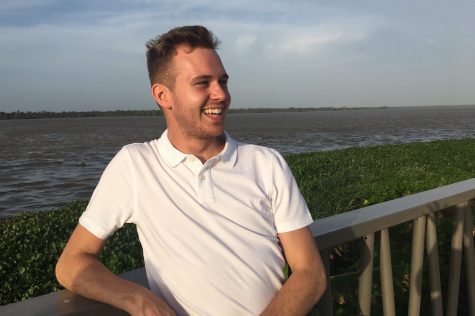
UI graduate Alex Bare returned to the U.S. from Colombia after the Fulbright Program was suspended. Bare had been in the country since July but was planning to stay for an additional year after his grant ended.
Bare was working as an English Teaching Assistant at a university in Barranquilla and taught English to Venezuelan migrant workers at a support center. As a teaching assistant, Bare gave U.S. cultural presentations to his classes and helped his students with difficult grammar concepts. The class in which Bare assisted had online modules which made it easy for the course to transition to be completely virtual.
At first, program participants were told they had the choice to stay or return home, Bare said. He initially planned to stay and shelter in place since he was planning to be in Colombia past the end of his program. Scholars in Colombia were told to evacuate not long after those in Brazil, he said.
“Even having to leave I still felt comfortable because I knew I was going to come back — I’m going to come back for that second year,” Bare said. “I didn’t get to say goodbye to most of my friends since it was such short notice, which is unfortunate. But, overall, I’ll be looking forward to being back in July.”
RELATED: Regents direct universities to recall all faculty, staff, and students out of the country
Bare is still waiting to learn whether or not his return to Colombia will be delayed further, but anticipates he will return when currently expected. While he is at home, Bare said he is working on setting up online classes for his Venezuelan students to help them continue learning English.
Another UI graduate, Nicole Hehr, was living and working in the city of Catanzaro in southern Italy as an English Teaching Assistant and had lived there since October. She was teaching English at a few high schools in the city and at the community center.
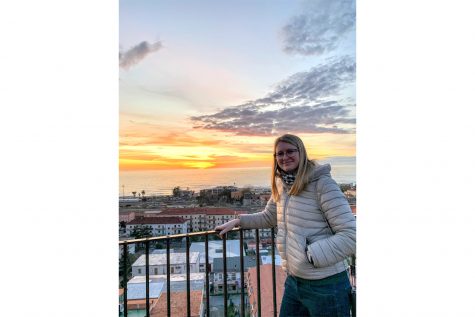
She was given the option to leave at the beginning of March after COVID-19 spread in northern Italy. Hehr was not near the epicenter of the outbreak and the region she was in was not greatly affected by the virus, she said. She had initially chosen to stay in Italy since traveling to a large city would put her at a higher risk of contracting the virus.
After Italy went into a full lockdown, Hehr received an email from Fulbright telling her she had two weeks to evacuate and return home. Then on March 11, President Trump banned travel from Europe, a day after Hehr was told she had two weeks to leave Italy.
“With this situation everyone was under lockdown so I didn’t see anyone again — my co-teachers, my students, my friends, nothing,” Hehr said. “I wasn’t able to bring everything back with me, I still have an apartment there that I’m on a lease for.”
Her landlord in Italy has been understanding of the situation. Upon her return to the U.S., she was asked to voluntarily quarantine for 14 days in which she monitored for symptoms. Hehr is now preparing for medical school in the fall by taking online courses.
Even though the evacuation process was hectic, Hehr said the participating in the program is worth it and does not regret it.
Like Hehr, Oberhart valued her opportunity to participate in the Fulbright Program but was disappointed her experience was cut short.
“It’s not the Fulbright Program’s fault that any of this happened,” Oberhart said. “It hurts a lot that I had to come back, but the State Department did what they thought was best for us.”



